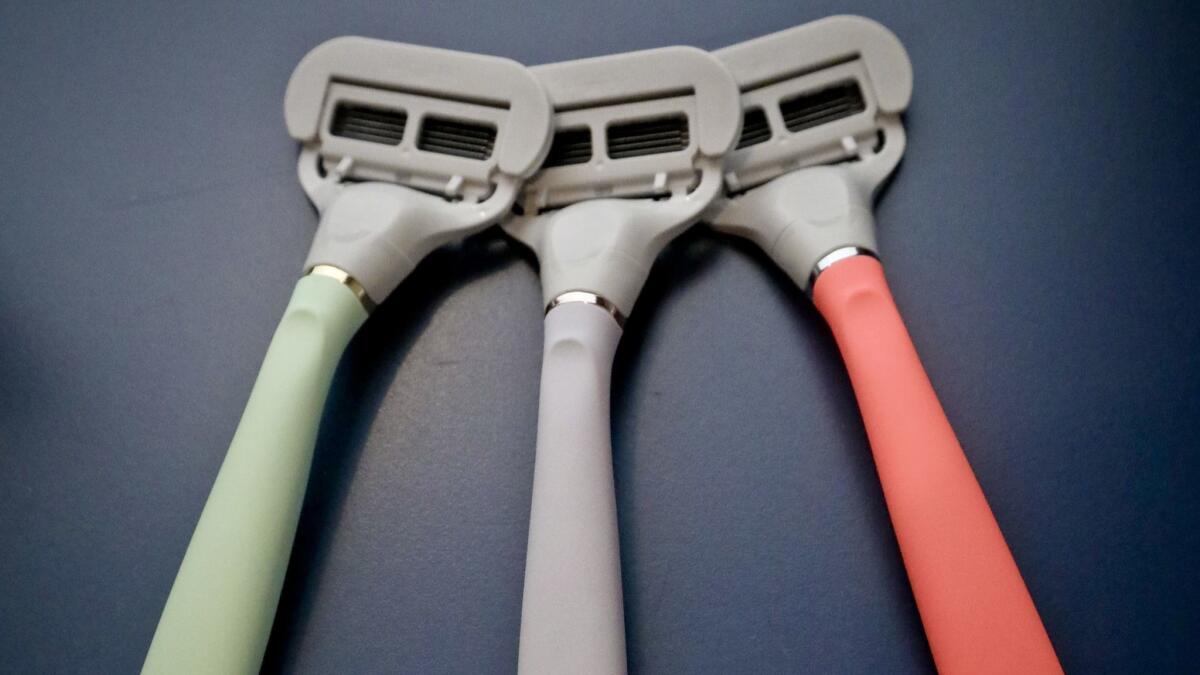Column: Harry’s razors company scores a $1.4-billion win for start-ups

- Share via
After years of getting nicked by upstart razor brand Harry’s Inc., the maker of Schick shaving products is now paying up to join forces with it.
Edgewell Personal Care Co. announced Thursday that it’s buying Harry’s in a stock-and-cash deal that values the newcomer at $1.37 billion. Harry’s founders, Andy Katz-Mayfield and Jeff Raider, have been named co-presidents of Edgewell’s U.S. operations, installing them as influential senior leaders at the combined business.
There’s a case to be made that the ultimate victory for Harry’s would have been continuing to grow as an independent company, vanquishing the old guard of the razor business it had set out to disrupt and perhaps going public. But, all things considered, I think this has to be held up as a success. That valuation is among the largest I’ve seen for any of the new breed of online-centric start-ups that sell their products directly to customers. And Harry’s founders are far from being sidelined in its next chapter.
The deal is the latest chapter in the ongoing razor wars that led Unilever to snap up Dollar Shave Club for $1 billion in 2016 and that prompted Procter & Gamble Co. to revamp pricing in its Gillette business. But the real significance of this moment may be the beacon of hope it provides for a whole class of digital-focused consumer brands that are hoping to prove their mettle and potential to investors.
The retail industry has been shaken for several years now by these upstarts, and their ascent has been enabled by abundant venture capital money as their cachet has grown among millennials frustrated by staid wares and shopping experiences. The early wave of these businesses included the likes of Warby Parker, Casper and Baublebar; more recent entrants include Allbirds and Glossier, both of which reportedly have reached unicorn status in recent private funding rounds.
As successful as these newcomers have been at grabbing market share from their more established rivals, this new retailing tribe has recently seemed to be getting stuck in a certain phase of the business life cycle. They regularly succeed at getting out of infancy. But then what?
Selling the company for an eye-popping sum or taking it public may be a coveted goal, but it has been rare. The previously mentioned Dollar Shave Club acquisition undoubtedly qualifies, but, until today, I was hard-pressed to come up with others. Bonobos selling itself to Walmart for $310 million was noteworthy because of what it symbolized about retail’s transformation, but that wasn’t exactly a dizzying valuation. And as for IPOs? I’d argue publicly traded highfliers Stitch Fix Inc. and Wayfair Inc. aren’t part of this group because their models are a bit different. Neither, really, is Blue Apron Holdings Inc., but even if it were, it’s not exactly a shining example, given that its shares have nosedived since its trading debut.
So we’ve largely been left with a bunch of maybes and almosts. There is chatter of a Casper IPO after a recent fundraising round valued it at $1.1 billion, and Bark, a pet products seller, has indulged IPO speculation. TechStyle Fashion Group, the company behind Fabletics, has reportedly explored a sale in recent years, as has Birchbox.
This Harry’s deal, though, provides a recent, tantalizing example showing that these companies can get to the next level. The timing for this message couldn’t be better, because online brands are bumping up against some limits as their old playbook for customer acquisition — which was heavy on social media marketing — is simply becoming tougher to execute as more brands clamor for our attention on Facebook and Instagram.
Harry’s and Edgewell probably will benefit from each other’s expertise. Harry’s clearly has strong branding capabilities and knows how to score at e-commerce. Edgewell has global scale and brands such as Playtex and Banana Boat that give it expertise and supply-chain capabilities outside the grooming industry, helpful if the Harry’s executives have ideas for new brands and product lines.
Those complementary features will ensure that this tie-up serves as a confidence boost for the entire universe of digital-native consumer companies looking to become mainstays in our pantries and medicine cabinets.
Halzack is a Bloomberg Opinion columnist covering the consumer and retail industries.
More to Read
Inside the business of entertainment
The Wide Shot brings you news, analysis and insights on everything from streaming wars to production — and what it all means for the future.
You may occasionally receive promotional content from the Los Angeles Times.







